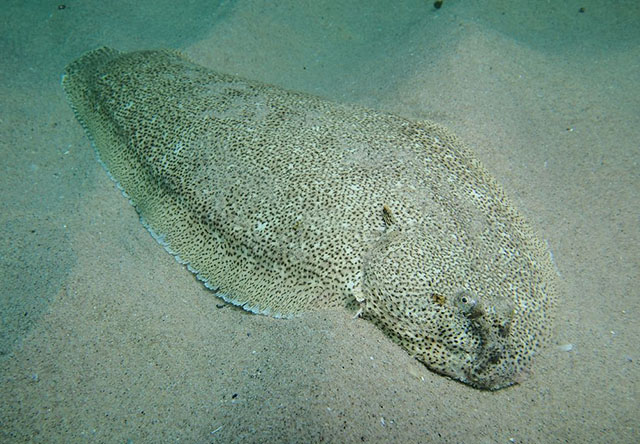| Soleidae (Soles) |
| 40 cm TL (male/unsexed); max.weight: 468.0 g |
|
demersal; brackish; marine; depth range 0 - 125 m |
| Eastern Atlantic: Cape Blanc (Mauritania) to Angola (Ref. 6805). Also in Mediterranean (Ref. 4710). |
|
Dorsal spines (total): 0-0; Dorsal soft rays (total): 73-83; Anal spines: 0-0; Anal soft rays: 57-67. Diagnosis: body oval, elongate, flat and asymmetric (Ref. 57416), hind part tapering (Ref. 4710). Eyes located on right side of head, except in reversed individuals (Ref. 57416). Upper eye its own diameter or more from dorsal profile of head; anterior nostril on blind side not enlarged; anterior nostril on eyed side with backward-pointing tube not reaching front border of lower eye (Ref. 4710). Preopercle covered by skin and opercle entirely scaled; mouth arched and inferior; dorsal and anal fins lacking spinous rays and confluent with caudal fin, no distinct caudal peduncle; last dorsal and anal rays not shorter than preceding rays and broadly united to outer caudal rays; dorsal fin originating on anterior profile of head; pectoral fins present on both sides with 6-10 rays; straight part of lateral line visible, supratemporal part slightly arched above eyes; body covered with ctenoid scales (Ref. 57416).
Description: lower lip ornamented with cirri (Ref. 57416).
Colouration: eyed side greyish-brown, with irregular black spots tending to form longitudinal series; these spots are better developed along lateral line (Ref. 4710, 57416). Dorsal and anal fins of same colour as body; pectoral fin darker near tip; blind side whitish (Ref. 57416). |
| Found on sand or mud bottoms (Ref. 2683, 4710) in shallow waters, from the shore to 60 m (Ref. 4710). No information available on diet or reproduction (Ref. 4710). Maximum depth from Ref. 122917. |
|
Data deficient (DD); Date assessed: 13 June 2012 Ref. (130435)
|
| harmless |
Source and more info: www.fishbase.org. For personal, classroom, and other internal use only. Not for publication.
